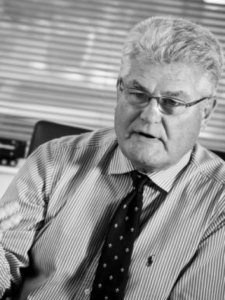31 Jul Field Service Expert Interview: Des Evans

 As part of our Field Service Management Expert Interview Series, we ask industry experts for their views on the market and what the future of field service management holds. We recently talked to Des Evans, a CEO advisor on service innovation, business transformation and the challenges of achieving growth through new service-based business models. As Sales Director and later CEO of MAN Truck and Bus UK until 2014, Des led the transformation of the company’s business model and helped it to become one of the leading providers of advanced after sales services and fleet management solutions. As a result, the business grew from £50 million to £500 million over a 10-year period and has become the subject of numerous academic case studies. Des was appointed Honorary Professor at Aston Business School in October 2014 and is involved in the development of the Aston Centre for Servitisation Research and Practice. He was awarded an OBE for services to the motor industry in 2016. Des is a passionate service innovator, and his focus is on helping senior business leaders discover, understand and act on the potential contribution that services can make to their growth strategy and develop their role as leaders in what is a significant organizational journey.
As part of our Field Service Management Expert Interview Series, we ask industry experts for their views on the market and what the future of field service management holds. We recently talked to Des Evans, a CEO advisor on service innovation, business transformation and the challenges of achieving growth through new service-based business models. As Sales Director and later CEO of MAN Truck and Bus UK until 2014, Des led the transformation of the company’s business model and helped it to become one of the leading providers of advanced after sales services and fleet management solutions. As a result, the business grew from £50 million to £500 million over a 10-year period and has become the subject of numerous academic case studies. Des was appointed Honorary Professor at Aston Business School in October 2014 and is involved in the development of the Aston Centre for Servitisation Research and Practice. He was awarded an OBE for services to the motor industry in 2016. Des is a passionate service innovator, and his focus is on helping senior business leaders discover, understand and act on the potential contribution that services can make to their growth strategy and develop their role as leaders in what is a significant organizational journey.
What significant trends in field service management have you noticed over the years, and how are they having a durable impact on the industry?
Over the last 10 years, the challenge for any field service organization has been to understand the impact of the digital revolution. That foundational shift combined with product life-cycle changes — shorter life-cycle, environmental pressure and regulatory impact. Whether it’s trucks, telephones or tree surgery, the market conditions are time and information sensitive. The customer expectation is for a speedy response to requests for service or quotations for new business. In our business, penalties for downtime failure can be punitive. Lost delivery time-slots are also punitive for operators. Product changes, recalls, and maintenance compliance require a range of specialist skills to create, distribute, and respond to the tsunami of knowledge and data generated by product/manufacturing operations or marketing communications today. The biggest trend affecting the service business right now is the increased use of digital platforms as well as the use of telematics for measuring and communicating performance and non-performance. Lastly, compliance with regulatory standards and electronic storage of service documentation for access by regulators are very important.
What are the future areas of growth in field service management?
Online diagnostics is growing, but the future will be shaped by the development of online prognostic capability, which will serve as an early warning system of premature machine failure and enable quicker service and parts response time in order to maximize uptime commitments.
How are you seeing field service organizations create new competitive advantages?
Any machine or equipment breakdown is frustrating and can be, at worst, life-threatening. Today’s competitive advantage is the company’s reputation, and that is more and more linked to the human factor. A reputation for great service through direct human contact is seen as a competitive advantage, as your people cannot be cloned or copied by others. They are your people! Your people are your competitive advantage.
What are your top three field service KPIs, and why do you identify these as the most important to measure?
- High level of customer satisfaction. Measured out of 10, 8.5+ should be your minimum.
- First-time fix rate. Measured as a percentage, 95+ should be your minimum target.
- Maximum uptime delivered to customers as defined by any service level agreement.
I would also add a fourth metric: staff satisfaction index. It is important that all field staff are engaged, empowered and motivated as they are the face to the customer and will determine the success of any enterprise.
You can connect with Des on LinkedIn.



